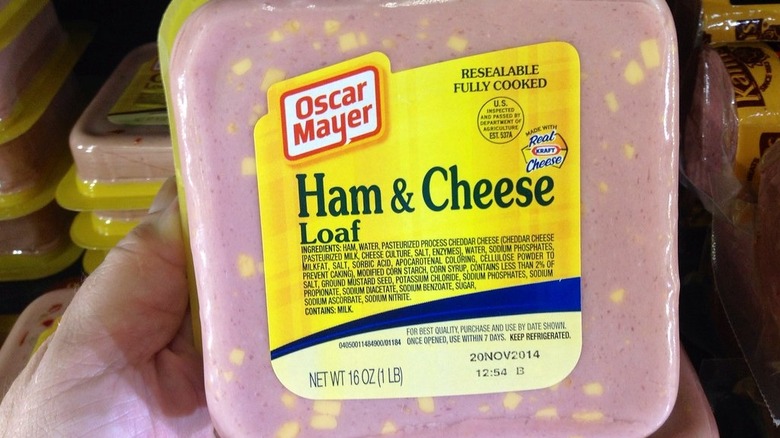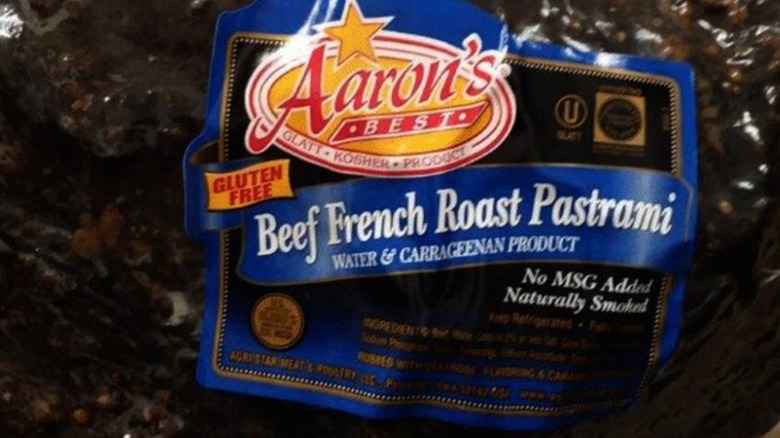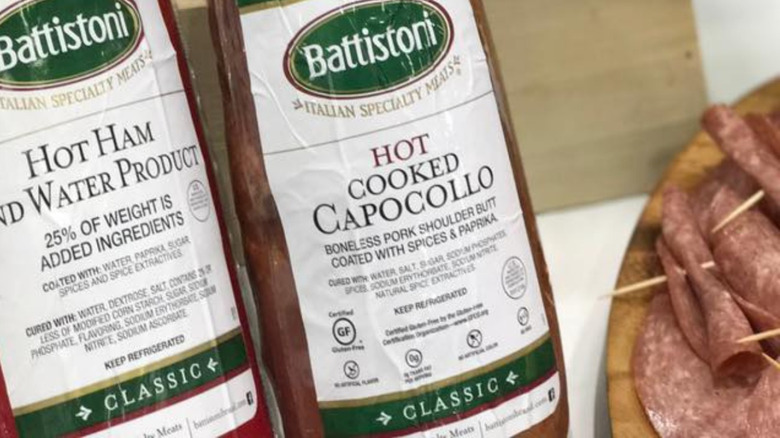The Biggest Deli Meat Recalls In US History
Deli meat is a staple for many Americans. In fact, research suggests that in just one month in 2020, more than 20 million people in the U.S. consumed six or more pounds of cold cuts, which includes meats like salami, ham, pastrami, and roast beef. But while tasty in a sandwich or as part of a charcuterie board, consuming deli meat doesn't come without risk. This particular group of meats can sometimes present a serious threat of foodborne illness.
Over the years, companies have worked with the USDA's Food Safety and Inspection Service (FSIS) to recall products from the market due to serious pathogens, like salmonella and listeria, for example. In some cases, undeclared allergens, a lack of federal inspection, or foreign objects have also led to recalls in the deli meat industry.
The trick to staying as safe as possible is staying informed, and always staying up to date on recalls. Below, we've compiled some of the biggest recalls in deli meat history, from minor incidents with packaging errors to major outbreaks of bacteria that led to serious illness and even death.
Ralph's Packing Company recalled more than 3,000 pounds of pork and beef bologna due to undeclared milk (2024)
In 2024, Oklahoma-based meat processor Ralph's Packing Company recalled more than 3,000 pounds of pork and beef bologna meat from the shelves due to a packaging error. The labels on the vacuum-sealed packs of Ralph's Circle R Brand Garlic Bologna and Ralph's Circle R Brand Garlic Bologna with Jalapeños did not declare milk, which, as an allergen, should always be listed on product packaging to inform consumers.
Milk is one of the most common allergens in the U.S., and if consumed by someone with an allergy, it can lead to extremely unpleasant and even dangerous symptoms. These include rashes, hives, swelling, and, in very rare cases, life-threatening anaphylaxis. Lactose intolerance is also common, although this is less severe and sufferers can often consume very small amounts of milk without symptoms.
At the time of the Ralph's Packing Company recall, the bologna slices had already been sent to deli counters across Oklahoma. Fortunately, however, there were no confirmed reports of allergic reactions associated with the products.
Boar's Head recalled more than 7 million pounds of deli meat due to listeria fears (2024)
Also in 2024, Virginia company Boar's Head was forced to issue a mammoth recall of 7 million deli meat products from across the U.S., as well as Mexico, Panama, the Cayman Islands, and Dominican Republic. The problem? Testing by the Maryland Department of Health discovered listeria contamination. Listeria is a strain of foodborne bacteria, and consuming anything contaminated with it can lead to a serious illness called listeriosis.
More than 70 products, including Boar's Head Strassburger Brand Liverwurst, Boar's Head Italian Cappy Style Ham, and Old Country Brand Canadian Style Bacon, were implicated in the recall.
Listeriosis, which has symptoms like fever, aches, chills, vomiting, and diarrhea, is especially dangerous for vulnerable people, including the elderly, the very young, and people who are pregnant. Unfortunately, in this instance, people did become sick from consuming the deli meat. By the end of August, nearly 60 people had been hospitalized and nine people had died as a result of the contaminated Boar's Head products.
Fratelli Beretta USA recalled charcuterie due to salmonella threat (2024)
Listeria isn't the only foodborne bacteria that can contaminate deli meat products. Again, in 2024, New Jersey brand Fratelli Beretta USA recalled more than 632,000 pounds of deli meat due to fears they might be contaminated with salmonella. This time, product samples did not test positive for the bacteria, but rather there were concerns that the coppa in the products (a type of dry-cured pork meat) was under-processed. Because of this, there could be potential for salmonella. Several products were affected by the recall, including Beretta Antipasto and Beretta Charcuterie Sampler. Once again, at the time of the recall, they had already been sent to retailers across the U.S.
The FSIS was concerned that the under-processed products could be contributing to a salmonella outbreak in several states in early 2024. Consuming salmonella can lead to an illness called salmonellosis, which is less severe than listeria, but can still be particularly dangerous for vulnerable individuals. In most cases, symptoms like cramps, diarrhea, and fever clear up within a week.
Alef Sausage Inc. recalled more than 61,500 pounds of deli meat due to temperature abuse (2023)
In 2023, Illinois sausage manufacturer Alef Sausage Inc. had to recall more than 61,500 pounds of deli meat products, including Sheikh Beef Salami Zabiha Halal, Sheikh Beef Bologna Zabiha Halal, and Sheikh Beef Cervelat Zabiha Halal, due to possible temperature abuse. Essentially, this means that the products were mislabeled, and did not include directions on the packaging that stated they should be kept in the fridge.
At the time of the recall, the products had already been sent to retailers and distributors in New York, New Jersey, and Philadelphia. The issue was brought to light when a New York State inspector for the Department of Agriculture and Markets found salami being kept outside of the fridge in a New York store.
Not storing products like deli meat at the correct temperature paves the way for deadly bacteria growth, which can lead to serious illnesses like salmonellosis or listeriosis. Every year in the U.S., nearly 50 million people get sick from foodborne diseases, while around 3,000 people die. Some of these instances are due to product contamination from the processor, but others are due to temperature abuse or reheating leftovers incorrectly.
Kraft Heinz recalled around 2,400 ham and cheese loaf products due to cross-contamination (2022)
Food giant Kraft Heinz has been caught up in many major recalls over the years. In 2015, for example, it was forced to recall its iconic blue box Original Macaroni & Cheese from stores across the U.S., the Caribbean, and South America due to potential metal contamination. In 2022, it was caught up in another recall. This time, it was because the Ham & Cheese Loaf deli meat products sold under its Oscar Mayer brand might have been contaminated with under-processed products when they were sliced on the same equipment as another product. As mentioned earlier, under-processed products are at a higher risk of containing harmful foodborne bacteria.
Unlike the mac and cheese recall, this time, the loaf had only been distributed to two states: Ohio and Virginia. Luckily, there were no reports of any illnesses associated with the recalled products. Anyone who had already purchased the Oscar Mayer Ham & Cheese Loaf was urged to dispose of it or return it to the store they bought it from for a refund.
Fratelli Beretta USA recalled roughly 862,000 pounds of deli meat due to the risk of salmonella (2021)
Fratelli Beretta USA was caught up in another recall in 2021, and once again, this was due to the risk of salmonella contamination. The New Jersey company recalled around 862,000 pounds of its Uncured Antipasto Prosciutto, Soppressata, Milano, Salami, and Coppa from stores across the U.S. amid fears of spreading the harmful bacteria.
Once again, the recall was issued because FSIS inspectors were concerned that the products were contributing to a salmonella outbreak in 17 states. Some of the people who reported sickness from salmonellosis told the authorities that they had consumed the antipasto deli meat from Fratelli Beretta USA before they got sick. As a result, the products were pulled off the shelves and anyone who had already purchased them was urged to dispose of them immediately or return them to the store for a refund.
Continental Glatt Kosher Meats Corp. recalled more than 61,000 pounds of deli meat due to a lack of inspection (2020)
In 2020, New York-based Continental Glatt Kosher Meats Corp. (which is known by its brand name First Choice Kosher Meat & Deli) pulled more than 61,000 pounds of deli meat off the shelves of stores across New York after the FSIS was informed they were being sold without federal inspection. Multiple products were implicated in the recall, including Beef Salami, Chicken Pastrami, Cooked Turkey Breast, Turkey Breast Mexican, and Olive Turkey Breast.
Usually, the FSIS inspects all facilities where meat or poultry is being produced to ensure compliance with the laws and regulations of the industry. This ensures that the environment the meats are produced in is safe and hygienic. If a product goes on sale without being inspected by federal authorities, it is usually recalled, just like with First Choice Kosher Meat & Deli. Fortunately, in this case, there appeared to be no safety issues with the products and no illnesses were reported in association with the recall.
Agri Star Meat and Poultry recalled more than 3,500 pounds of pastrami due to a risk of under-processing (2018)
In 2018, under-processing caused yet more problems in the deli meat industry. This time, Iowa company Agri Star Meat and Poultry was at the center of an under-processing driven recall which led to more than 3,500 pounds of beef pastrami being pulled from distributors in five states: California, Florida, Illinois, New York, and Washington. The products were sold under two names, Aaron's Best Beef French Roast Pastrami and Shor Harbor Glatt Kosher Beef French Roast Pastrami.
The problem was brought to light when the company received a complaint from a customer who had already purchased one of the products, stating that the meat inside was discolored. It turns out, this was likely because they were not processed with enough curing solution. Usually, cured meats like pastrami are covered with a salt-based solution, which also contains sugar and nitrites/nitrates, and helps to preserve the meat and protect it from bacteria growth. It also helps it to retain its color and flavor for longer.
Fortunately, the lack of a curing solution didn't cause any serious problems for Agri Star Meat and Poultry. There were no illnesses associated with the recall. As a precaution, anyone who had purchased the products was encouraged not to consume them.
Battistoni Italian Specialty Meats recalled more than 22,600 pounds of salami and capocollo due to contamination (2017)
Not all recalls are linked to a risk of foodborne bacteria. Often, products are pulled from the shelves because they are contaminated with a foreign object. This was the case in 2017, when New York brand Battistoni Italian Specialty Meats had to recall more than 22,600 pounds of deli meat from foodservice establishments in New York, Maryland, Massachusetts, New Jersey, Pennsylvania, and Virginia over fears they contained aluminum.
Objects like metal and plastic, which can cause choking, oral injuries, or internal cuts, often sneak their way into food products during the processing phase. In this case, an aluminum clip, likely used in manufacturing, was found inside one of the deli meat products. This led to a recall of Battistoni Genoa Salami With Wine and Battistoni Hot Cooked Capocollo. Luckily, there were no injuries reported as a result of the contamination.
Manda Packing Company recalled 468,000 pounds of deli meat due to listeria concerns (2013)
In 2013, listeria was the cause of another major recall. Louisiana company Manda Packing Company recalled 468,000 pounds of products like Manda Supreme Roast Beef, Manda Pastrami, Four Star Pastrami, and Leblancs Turkey Breast from deli counters across 13 states amid fears they were contaminated with the deadly bacteria.
The bacteria was discovered when the Tennessee Department of Agriculture picked it up during routine testing of a cooked roast beef product from Manda Packing. This led to more products from the company being tested, which also returned positives for listeria.
Listeria affects around 1,600 people in the U.S. every year. While many people recover on their own without treatment, as mentioned earlier, it is particularly dangerous for vulnerable individuals. Pregnant people are especially at risk from listeriosis, and the infection can even lead to complications like miscarriage and stillbirth. Luckily, in this particular case, there were no reports of listeriosis associated with the recall.
Rose & Shore Meat Co. recalled nearly 16,000 pounds of deli meat due to listeria fears (2011)
California brand Rose & Shore Meat Co. was also affected by listeria in 2011. At the time, it was forced to issue a recall for nearly 16,000 pounds of deli meat products, including Olympic Gold Beef Pastrami, Cooked Angus Roast Beef, and Rose and Shore New York Style Pastrami, after company tests came back positive for the bacteria. At the time of the recall, the deli meat had already been sent to foodservice distribution centers in California. Fortunately, there were no reports of illness linked with the recall.
Listeria is a common cause of food recalls because it is incredibly resilient and nimble. The bacteria can spread quickly while undetected in food processing facilities and factories, and once it's there, it's hard to get rid of. This is because it is resistant to cold temperatures, and can even grow in refrigerated food. The only way to kill listeria is by cooking food to a high temperature. This can be a problem with cold cuts or deli meats, which might be contaminated after they've been cooked in the factory and aren't usually heated again before consumption.
Zemco Industries recalled 380,000 pounds of deli meat due to listeria (2010)
In 2010, listeria struck the deli meat market again. New York company Zemco Industries pulled roughly 380,000 pounds of products — including Marketside Grab and Go Sandwiches Black Forest Ham and Marketside Grab and Go Sandwiches Virginia Brand Ham — from delicatessens across the U.S. after testing revealed its deli meat could contain listeria bacteria.
Again, it was fortunate that there were no illnesses associated with the recall. Listeriosis is not just a risk for pregnant women, but it can also endanger the lives of newborn babies, who could develop lifelong health problems as a result of the illness. The very old are also at risk, and this is because their immune systems tend to be less efficient at handling foodborne pathogens like listeria. To reduce the risk of contracting the illness, the FSIS urges anyone who eats deli meats, like luncheon meats, to reheat them until they are steaming hot.
Pilgrim's Pride recalled more than 27 million pounds of deli turkey and chicken amid listeria outbreak (2002)
Listeria has been plaguing the deli meat industry for many years. Back in 2002, major chicken producer Pilgrim's Pride, which is one of the biggest in the U.S., recalled more than 27 million pounds of turkey and chicken deli meat products, including turkey pastrami, chicken breast, and turkey ham, from the market amid listeria concerns.
The bacteria was found in one of the company's Philadelphia meat processing facilities — which was producing products for its Wampler Foods brand, as well as Block & Barrel, Bonos, Golden Acre, and Reliance — while investigators were searching for the cause of a separate outbreak in eight states. To be clear, the deli meat from Pilgrim's Pride was ruled out as the cause of that outbreak, but its products were still pulled from the market as a precaution. At the time, the recalled products accounted for around 6% of the company's entire production.
Sara Lee recalled 35 million pounds of deli meat in 1998 due to a listeria outbreak (1998)
In one of the biggest scandals in deli meat history, in 1998, the Sara Lee Corporation was forced to recall around 35 million pounds of deli meat from shelves across the U.S. due to concerns they were contaminated with listeria. In this particular instance, CBS News reported that the company allegedly knew that the bacteria was present in one of its Michigan meat processing plants, but failed to do anything to stop it from shipping out deli meat to stores across the country. This resulted in the deaths of around 15 people, and sickened around 80 others. It also caused around six miscarriages.
As a result of the alleged cover up, Sara Lee was fined $200,000. It also was forced to donate $3 million to Michigan State University, to help fund research into food safety. On top of this, it paid $1.2 million to settle a lawsuit over the incident.














